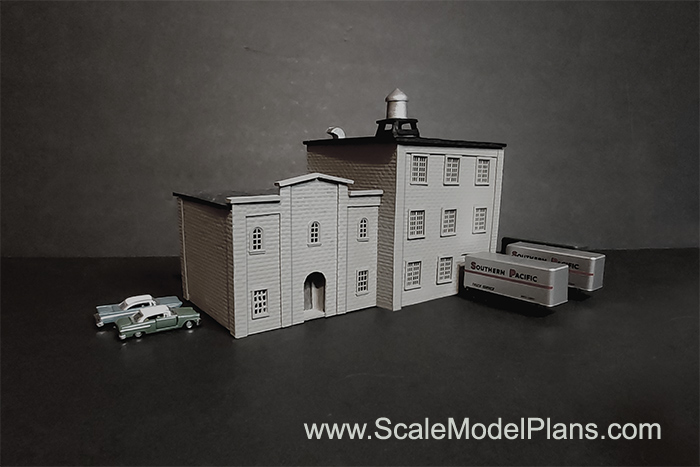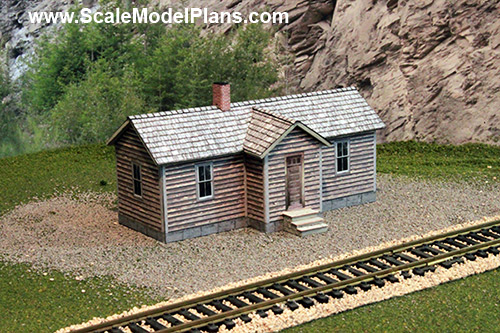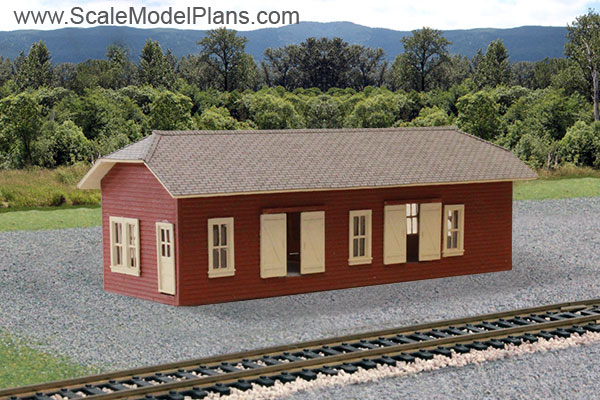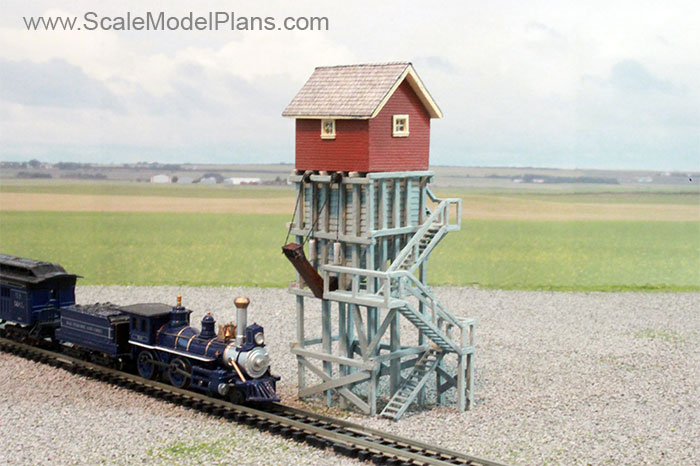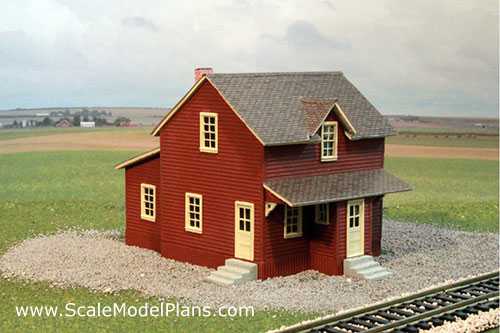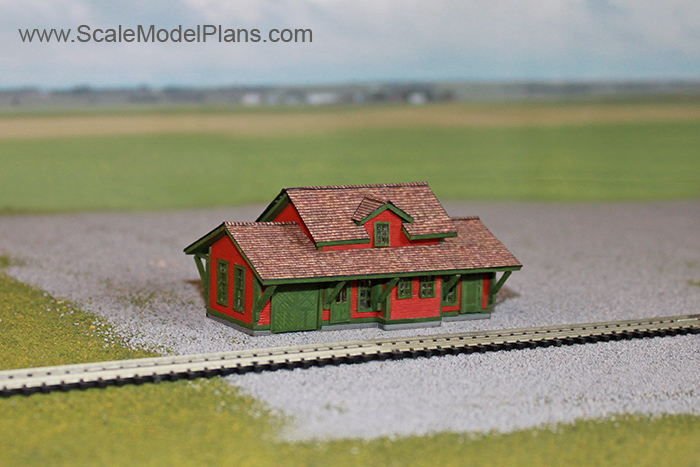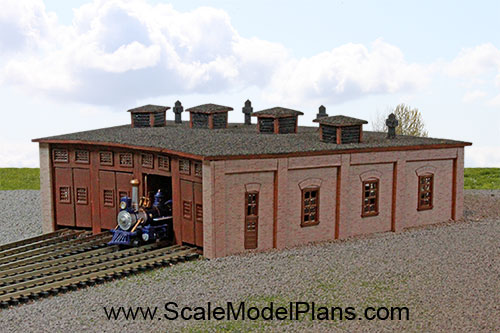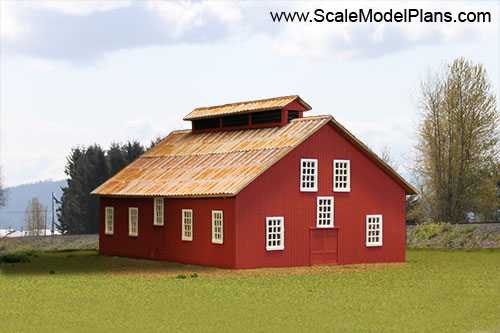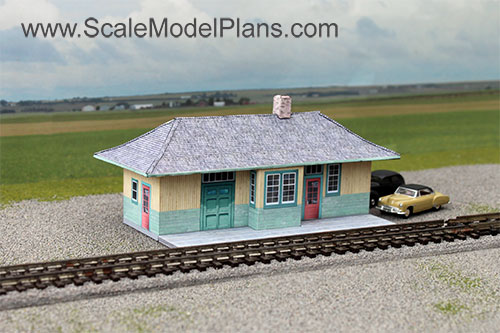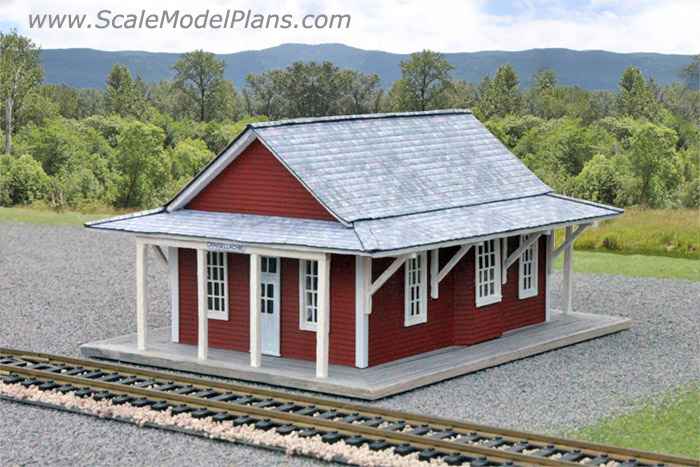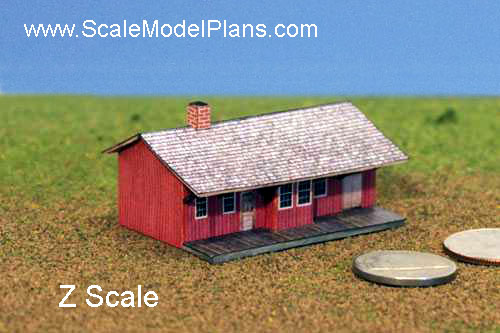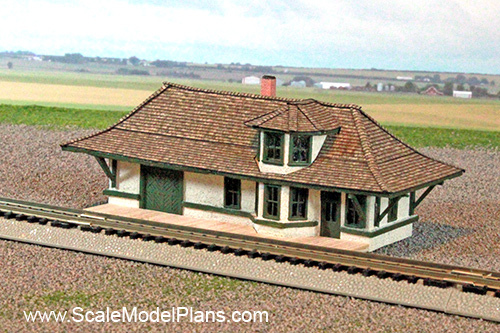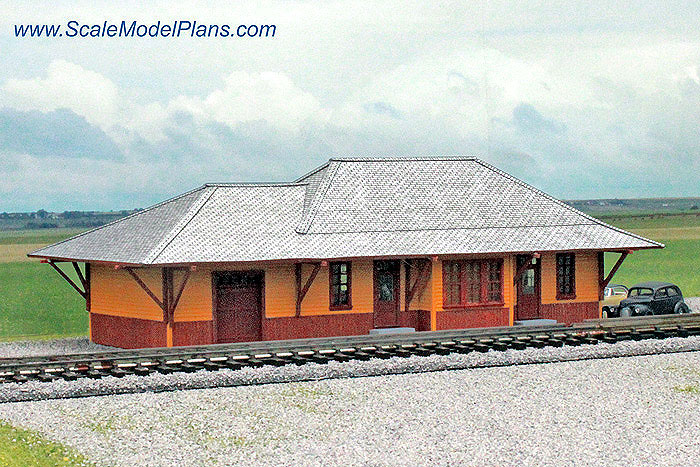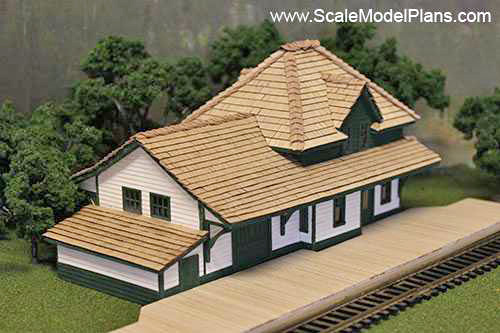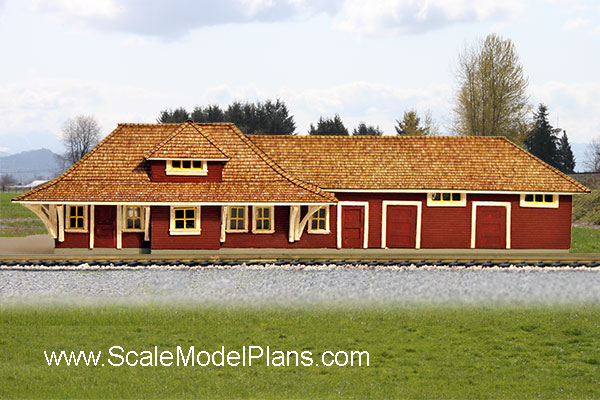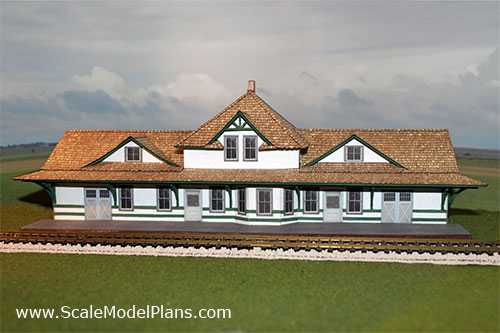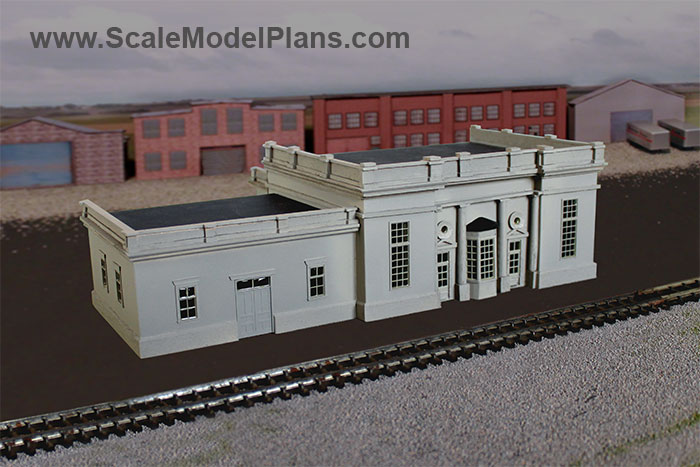Please allow Pop-ups from scalemodelbuildings.co in order to fully utilize our website
(All prices are in U.S. dollars)
Model Train Structures - Scratch building made easier!
Each scale model plan package contains the following PDF files (unless otherwise noted):
Actual Size Plans
Traceable Templates
Construction Guides
*Free Cardstock Offer:
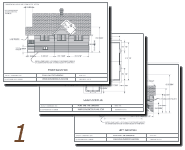
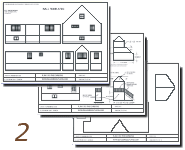

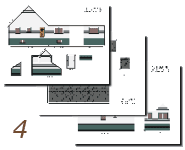
Detailed set of scaled plans, enabling true "scratch-built" construction.
Accurately scaled templates, allowing you to trace out and build to your choice of materials.
Illustrated 12 page Generic Construction Guide plus 11 page Cardstock Modeling Guide.
* Pre-colored printable cardstock patterns are included as a free bonus and are not factored in to the cost of the plans. Click here for details. Colors may differ from models shown. Contact us for color information and availability on individual plans. The Intellectual Property License Agreement allows you to print multiple copies for your own personal use, as well as construct multiple copies or variations, for your personal use, of each Plan purchased.
All of our plans print to standard letter size paper.
On this page
Plan 2620: Abandoned Ohio Factory
PDF Plan package: $9.95
Historically, Ohio had many things in its favor leading it to becoming one of America's foremost manufacturing centers. Machinery, motor vehicles, rubber and plastic products, and food processing were some of the several products produced in the many factories in various cities across the state. Proximity to U.S. and Canadian markets was facilitated by railroads and highways. Many of these old factories have been either torn down and rebuilt, or repurposed as residential or commercial spaces. At the time of researching, this example was abandoned, but plans were underway for renovation and repurposing.
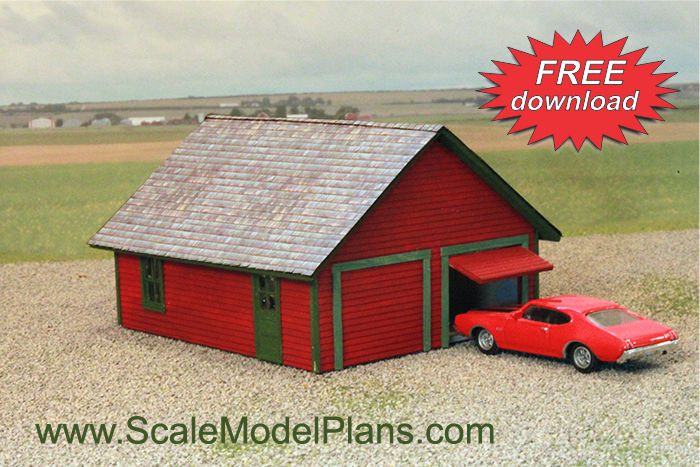

Plan 576 - Two-car Garage - Free Download with coupon
PDF Plan package $4.95 (Free Download with coupon)
Residential garages have been part of the architectural landscape for almost as long as there have been cars. Two car garages became popular in the sixties and seventies as more and more families became 'two-car families'.
This garage would look right at home with almost any era of twentieth or twenty-first century house.
To show our appreciation to the many customers over the past twelve years from over sixty countries around the world, and to welcome and encourage newcomers, we offer this complete plan package as a free download.
Enter Coupon Code 1122pln576 at Checkout.
Value $4.95
Be sure to watch the Three-part video tutorial on Scratchbuilding this project!
Evan Designs MB program templates available
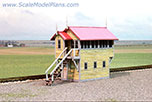
Model Builder users:
For Licensed users of the Evan Design Model Builder software program we have created importable template files allowing you to easily create your own customized cardstock version of our plans. Click here for more information.Instant download:
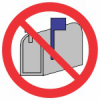
It's This Easy:

Place your order, pay securely with PayPal - even if you don't have a PayPal account. No waiting - plans are not sent by mail. Download your plans immediately to get started on your next project! Questions? Contact Us
Please read License Agreement and Privacy Policy prior to ordering

Help us STOP Theft!
Someone once said that copying is a form of flattery. Unfortunately, it can also be a form of theft. Please help us to continue our work by fighting piracy and maintaining the honesty and integrity of our hobby.
Thank You For Your Support!
What if you have a pirated copy? Just click "Add to Cart" and make it right. Thank you!
Plan 444 - Grand Trunk Pacific Bunkhouse
PDF Plan package: $7.95
The Grand Trunk Pacific Railway was formed in 1903 as a subsidiary of the Grand Trunk Railway. The GTP mainline ran from Winnipeg, Manitoba, to the port of Prince Rupert, British Columbia. Financial difficulties led the GTP and the GTR to merge with the Canadian Northern to become part of the Canadian National Railway.
Bunk houses such as these provided sleeping accommodations for railway work crews along the routes. Several railroad lines on both sides of the border used similar designs, which were sometimes modified to be used as portable stations.
Evan Designs MB program templates available
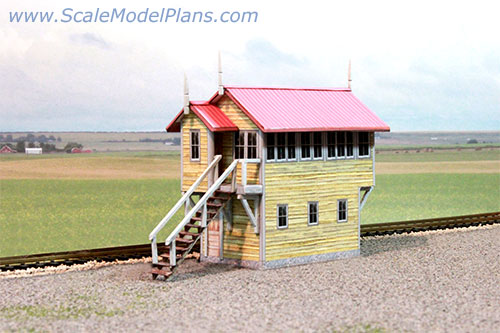

Plan 445 - Greymouth NZ Signal Box
PDF Plan package: $8.95
Greymouth, on the West Coast of the South Island of New Zealand, is the western terminus of the Midland Line from Christchurch. It is also the terminus of the TranzAlpine, a tourism orientated rail journey often considered to be one of the most scenic in the world.
As technology encroaches on the traditional rail traffic control systems, signal boxes such as this one are either demolished, or if good fortune prevails, are declared heritage sites and restored to their former glory.
This is the HO Scale version using textures from the Model Builder ® software program.
Visit Evan Designs for details on purchasing Model Builder.®
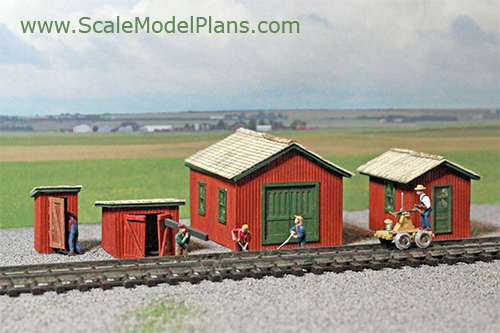

Plan 545 - Trackside Buildings
PDF Plan package: $8.95
This set consists of a Section Tool House, Lineman's Tool House, storage shed, and of course, the organic sewage disposal facility. Although these structures were modelled after trackside maintenance sheds, they could easily be used as farm or other accessory buildings.
Vertical siding and shake roofing is from Northeastern Scale Lumber Co.
This is a good project for using up short ends and scrap pieces.
* Please note: This plan includes tiny buildings, so N scale may require more intricate modelling skills.
Evan Designs MB program templates available
A lot goes on behind the scenes at scalemodelbuildings.co... Click Here for Info.
Plan 730 - NYLB Matawan Freight Shed
PDF Plan package: $3.95
Back in 1876 you could get a one way ticket on the New York and Long Branch Railroad from Matawan, New Jersey to New York City for under a dollar.
The Matawan depot was one of five identical stations using the same mid-Victorian design. The freight shed shared the same 'half-hip' roof style, and is similar in design to many such railway buildings across North America.
Click on the links to see the various construction techniques using our Plan Package. Click Here for details.
Evan Designs MB program templates available
Plan 1042 - Coaling Station
PDF Plan package: $9.95
In the days of steam locomotives, travel distances were limited by the available on board storage of fuel and water. Tenders attached to the locomotives were designed to increase this capacity, allowing a train to travel greater distances, but regular stops were still necessary. Coaling stations were regular sights along rail lines. This is a 25 Ton capacity tipple capable of filling about three to four locomotives a day. Coal was dumped from a hopper car, then shoveled into a skip bucket, which was raised to the top of the tower by an electric winch.
* Note: The cardstock version will require some balsa components. (N Scale lumber version shown)
Evan Designs MB program templates available
Plan 892 - CNoR Section House
PDF Plan package: $8.95
Railway section houses took various forms and could be used for anything from railway worker housing to storage or maintenance of railway equipment. The CNoR Railway, (later to become part of CNR), built several combination Station/Section Houses which were often used as accommodation for the Stationmaster and his family. This version included a passenger waiting room on the main floor.
Siding, windows, and doors are from Northeastern Scale Lumber Co.
Evan Designs MB program templates available
Download the FREE window and door template. Simplify locating and cutting out door and window openings.
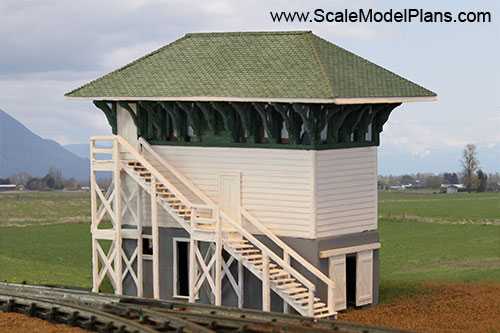

Plan 1144 - A, T & SF Railroad Control Tower
PDF Plan package: $9.95
This Atchison, Topeka, and Santa Fe Railroad Control Tower was one of several constructed in the early 1900's.
Originally these towers housed manual interlocking systems, but were later outfitted with electric systems.
Siding and doors are from Northeastern Scale Lumber Co.
Evan Designs MB program templates available
Plan 1179 - CN Depot & Section House
PDF Plan package: $9.95
Along the once famous gold route in the Fraser Canyon of British Columbia stood Chapman's Station, one of CN's combination station and section houses. Designed to accommodate the stationmaster's family, there were three bedrooms, a living room, with a kitchen attached to the rear of the structure. A separate entrance led to a waiting room, ticket office, and a separate bedroom for the ticket agent. A freight shed occupied the other side of the structure. Similar stations appeared in various locations across the country, with a still standing variation in Valemont BC.
This is the N scale version using 1/32" Clapboard siding from Northeastern Scale Lumber.
Evan Designs MB program templates available
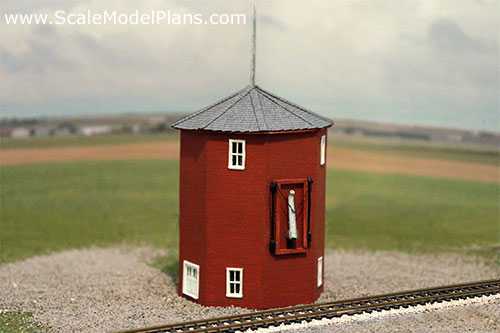

Plan 1390 - Water Tower
PDF Plan package: $8.95
In the days of steam locomotives travel distances were limited by the available on board storage of fuel and water. Tenders attached to the locomotives were designed to increase this capacity, allowing a train to travel greater distances, but regular stops were still necessary. Water towers were regular sights along rail lines. This example is modeled after a 40, 000 gal. tower common to CNR, CPR, and many other railroads across Canada and the U.S.
This is an N Scale model constructed with 1/32" clapboard siding from Northeastern Scale Lumber Co. Roofing texture was generated by Model Builder ® software.
Evan Designs MB program templates available
Plan 1438 - New Haven Railroad Engine house
PDF Plan package: $9.95
The New York, New Haven & Hartford Railroad, sometimes referred to as just New Haven Railroad, was a consolidation of several smaller railroads in the Northeastern United States during the late 1800's.
This engine house, on the New Haven "Wrentham Line" half way between Boston, Massachusetts and Providence Rhode Island, operated from 1892 to 1938. Although it still stands today, it now serves only as a storage warehouse.
This N Scale version is constructed with balsa covered in printed brick paper, with windows from Northeastern Scale Lumber Co. The modular plans allow for anywhere from one to over twelve bays, depending on your available space. (*includes 'photo-texture' cardstock sheets)
Evan Designs MB program templates available
Plan 2455 - East Broad Top Railroad Blacksmith Shop
PDF Plan package: $8.95
The East Broad Top Railroad was a narrow gauge railway established in the 1870's to haul coal from the Broad Top Mountains to Mount Union, Pennsylvania. As the demand for coal diminished the railroad ceased operations, but was resurrected as a tourist attraction by the East Broad Top Railroad Preservation Association.
The blacksmith shop is shown here in HO scale.
Windows and siding from Northeastern Scale Lumber Co.
Evan Designs MB program templates available
Plan 606 - Grand Trunk Railway Depot
PDF Plan package: $8.95
The Grand Trunk Railway and it's many subsidiaries operated in several U.S. States and Canadian Provinces. The GTR main line operated in Maine, Ontario and Quebec. The Grand Trunk Pacific Railway operated in Manitoba, Saskatchewan, Alberta, and British Columbia, while the Grand Trunk Western Railway operated in Michigan, Indiana, and Illinois.
The Grand Trunk Railway Standard Station Type No. 1, as shown in the cardstock version, and the slightly larger Type No. 2 version serviced some of the smaller stops along the various routes. The Garden Scale version is available at ScaleModelBuildings.com.
Evan Designs MB program templates available
N Scale customers contact us for a free roofing material download. We know that it is sometimes difficult to find suitable roofing material for N scale structures, so we will include a sample download on request. Existing customers just include the email address used on your most recent order and mention "free roofing" in your request.
Plan 616 - The Last Spike
PDF Plan package: $8.95
When British Columbia joined Canada as it's sixth province, one of the promises made was the construction of an intercontinental railway linking BC to the rest of Canada, to be completed within ten years. Ten years came and went, but it was not until responsibilities were assumed by the newly incorporated Canadian Pacific Railway that the project reached completion. Craigellachie, located between Salmon Arm and Revelstoke on the Trans-Canada Highway, is the site of the historic last spike of the railway linking British Columbia to Eastern Canada on November 7, 1885.
This model uses windows and doors from Northeastern Scale Lumber Co., and styrene clapboard siding from Evergreen Scale Models.
Evan Designs MB program templates available
Plan 735 - Central Ontario Railway
PDF Plan package: $7.95
One of several smaller railways that ultimately became part of Canadian Northern was the Central Ontario Railway. One of the focuses of this railway was to service the various mines in the area. With slight alterations to window and door placement, this model could represent COE Hill, Frankford, Marmora, or others along the Central Ontario routes.
Shown in Z Scale (from N Scale plan package)
Evan Designs MB program templates available
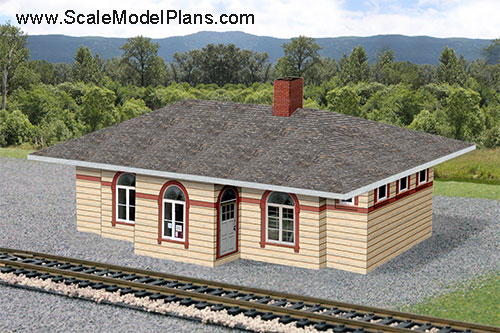

Plan 821 - Charlbury Station
PDF Plan package: $8.95
This train station is modeled after the Charlbury Railway Station in the town of Charlbury, Oxfordshire, England. Opened in 1853 by the Oxford, Worcester and Wolverhampton Railway, the station is still very active and is operated by First Great Western along the Cotswold Line.
Shown in OO Scale cardstock construction, package also includes plans and templates for construction in wood or styrene.
Evan Designs MB program templates available
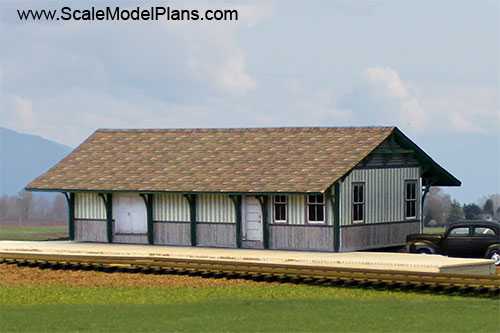

Plan 879 - Princeton Station
PDF Plan package: $7.95
The Princeton Railroad Station was constructed for the Florida Eastern Railway around 1904 by the Drake Lumber Company, who also built several other similar depots along the FEC line. Some of these are still in existence.
This example was constructed with textures generated by Model Builder ® software.
Evan Designs MB program templates available
Are you a Model Builder ® User? Click here for information on integrating our plans with Model Builder software.
Plan 1046 - Grand Trunk Pacific Type E Station
PDF Plan package: $9.95
The Grand Trunk Pacific Railway was formed in 1903 as a subsidiary of the Grand Trunk Railway. The GTP mainline ran from Winnipeg, Manitoba, to the port of Prince Rupert, British Columbia. Financial difficulties led the GTP and the GTR to merge with the Canadian Northern to become part of the Canadian National Railway.
This is a N scale model done in balsa wood, finished with Rust-Oleum Multicolor Textured paint. (Roofing material print out is included with N Scale version)
Evan Designs MB program templates available
Plan 1569 - Chicago, Milwaukee & St. Paul Railroad Depot
PDF Plan package: $9.95
The Chicago, Milwaukee and St. Paul Railroad had its' beginnings in the mid 1850's with the purpose of linking the Great Lakes with the Mississippi River. In 1863 as the Milwaukee and St. Paul Railway, it gradually acquired other smaller railways working its' way west to Seattle. This depot is typical of a style that could be found anywhere from Washington State all the way to Minnesota.
The scaled lumber version uses clapboard and board & batten siding from Northeastern Scale Lumber Co. Cardstock version uses balsa eave brackets.
Evan Designs MB program templates available
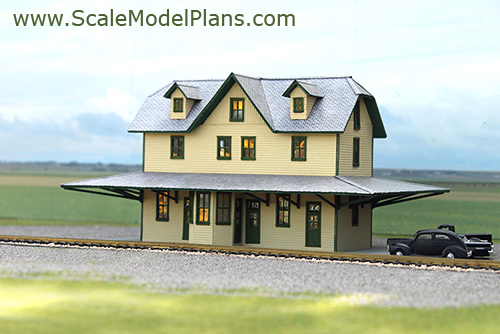

Plan 1730 - NYLB Depot
PDF Plan package: $9.95
Back in 1876 you could get a one way ticket on the New York and Long Branch Railroad from Matawan, New Jersey to New York City for under a dollar. The Matawan and Red Bank Depots were two of five similar stations using the same mid-Victorian design. The ‘half-hip’ roof style is similar in design to many such railway buildings across North America. The NYLB Matawan freight shed is available as Plan 730.
This is the HO Scale version using scaled lumber from Northeastern Scale Lumber. Garden Scale and 1:10 scale for RC vehicles available here. The cardstock version will require balsa eave brackets.
Evan Designs MB program templates available
Plan 2008 - CNR 3rd Class Depot
PDF Plan package: $9.95
The Canadian Northern Railway, (later absorbed into the Canadian National Railway), built various versions of their 3rd Class Depot from as far west as Fort Langley, B.C. down into various locations in Minnesota. One of the reasons for the popularity of the design was the integration of living accommodations for the agent's family.
The dormers brought light and extra space to the upstairs bedrooms. The kitchen was located in the rear addition. This Fort Langley version uses milled basswood siding and handmade "barn" shakes, which were common on the West Coast of British Columbia. Some of these depots were originally finished in stucco, so this model could be constructed with foam core as well.
Package includes plan for hand-made eave brackets and platform. Windows and siding available from Northeastern Scale Lumber Co. Shakes are hand made (See tutorial.)
Evan Designs MB program templates available
Plan 2054 - CPR Depot
PDF Plan package: $9.95
The CPR station in Blyth, Ontario was once a stopover between the cities of Goderich to the west and Guleph to the east. The design followed CPR's Plan 10, which was repeated in several other locations throughout Ontario.
Passenger service from Goderich began in 1907, declining by the 1950's, to be replaced by a mixed freight/passenger service.
This is an N Scale example using 1/32" Lap siding and HO Scale windows and doors from Northeastern Scale Lumber Co. (See Window Chart on using HO windows for N scale structures).
Evan Designs MB program templates available
Plan 2062 - CNoR 2nd Class Station
PDF Plan package: $9.95
Although not as common as the CNoR 3rd Class design, there were roughly thirty 2nd Class Stations scattered across Canada and down into Minnesota. Like the 3rd Class version, these were combination depot/section houses, often accommodating the Stationmaster and his family.
This example is modeled after the station in Radville Saskatchewan, where the original is being restored by a dedicated group of volunteers.
Evan Designs MB program templates available
Plan 2082 - Monon Depot
PDF Plan package: $9.95
The Monon Depot in Lafayette, Indiana was built in 1901, and is one of six limestone structures built for the railroad. Also known as the Chicago, Indianapolis, and Louisville Railway, the Monon underwent various mergers and transitions over the years until the final day of regular passenger service in September of 1967. The structure has been spared demolition, and now serves as a civic theater.
The HO scale example shown here was done using foam board and balsa wood.
The design of this structure would be suitable for other uses such as a bank or courthouse.
Evan Designs MB program templates available
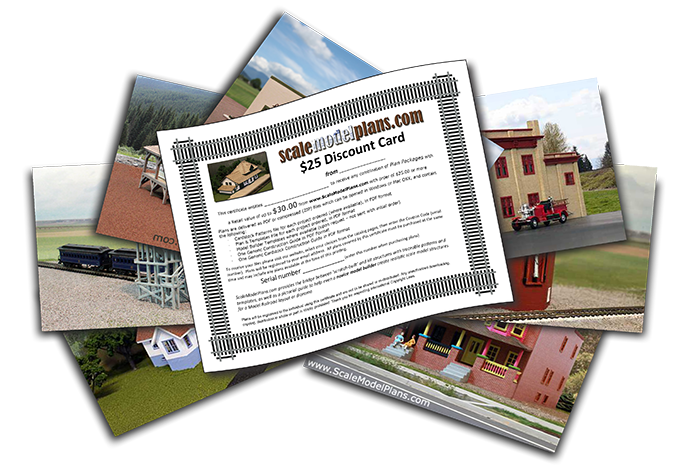
For a friend or yourself! Save up to 20%
$25 (up to $30.00 value) or
$50 (up to $60.00 value) or
$100 (up to $120.00 value)
These Discount Cards can be used to purchase several plans of up to a total retail value of up to 20% over face value. The certificate will be emailed to you as a PDF file, which you can print out or send to a friend as an email attachment. Instructions on redeeming plans are contained on the gift certificate.
This is a perfect gift for a model railroader or model builder who enjoys either building from scratch or cardstock. Choose from over 100 plans.
Coupon Code (Serial number) will be sent by separate email.
Coming Dec. 2023: TBA
Building a scale model structure
for your model railroad layout or diorama from scratch can be a very rewarding experience. The satisfaction comes not just from the economical savings, but from the fact that you built it from scratch. It may not be as difficult as you think either. If you have ever constructed a model. whether it's a car, an airplane, or a model structure, you know that all the pieces do not necessarily fit together as they should, and you end up doing some extra cutting, sanding, or customizing to make them fit anyway. Depending how you look at it, building from our plans only involves a few extra steps, and the benefits are worth it. Each plan is applicable to a variety of materials. You can use one set of plans to build several distinctive buildings just by choosing different building materials. Give it a try. Beginners Welcome!
Contact Us © 2023 T. Carson Legal













